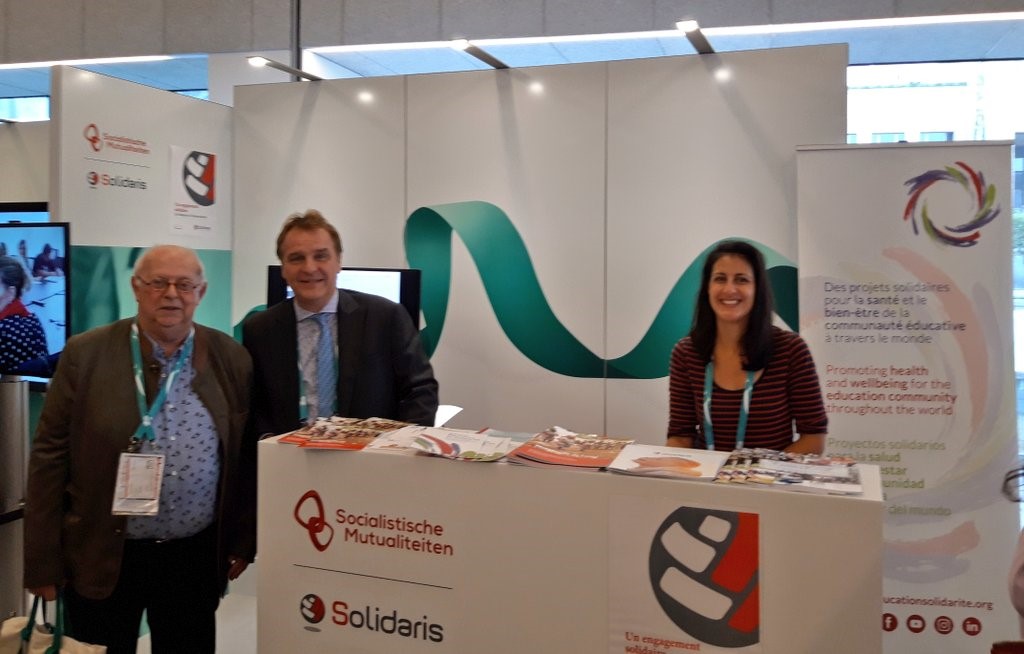Solidaris and the Education and Solidarity Network participated in the World Social Security Forum of the International Social Security Association, which was held from 14 to 18 October 2019 in Brussels at the invitation of the Belgian public social security institutions. The forum brought together 1,300 managers and experts from the social security sector with the aim of sharing inspiring experiences and effective strategies for improving “individual protection in a changing world”.
Solidaris and the Education and Solidarity Network participated in the World Social Security Forum of the International Social Security Association, which was held from 14 to 18 October 2019 in Brussels at the invitation of the Belgian public social security institutions. The forum brought together 1,300 managers and experts from the social security sector with the aim of sharing inspiring experiences and effective strategies for improving “individual protection in a changing world”.
5th edition of the World Social Security Forum
Founded in 1927 under the auspices of the International Labour Organization (ILO), the International Social Security Association (ISSA) brings together 320 member institutions across 150 countries that provide social protection to more than three billion people each day. Belgian and French socialist mutual benefit societies are among the 17 founding members of the association.
Organised by the ISSA every three years, the World Social Security Forum is scheduled with several highlights spanning outcomes and perspectives.
- Three years on after the first report of its type, the ISSA presented a new one with “10 global challenges for social security – 2019 developments and innovation”. This highlights the commitment of social security institutions around the world to adapt to the digital economy and to forms of work which follow this, to tackle demographic changes, extend coverage, meet growing expectations of citizens, in particular in the area of healthcare and long-term care, and to assure the development of skills;
- A new series, “Guidelines on errors, evasion and fraud in social security systems” has been launched. It forms part of an integrated and global approach. Eight other series of “Guidelines for social security administration”, including “good governance” have also been revised.
- “Social security for the digital age” was examined in relation to an ISSA publication which considers digital technologies and their impact on social security systems to highlight both challenges and opportunities. Six priority areas for action have therefore been identified: legal security and the harmonisation of platform worker statuses; guarantees for viable financing of social security systems; data protection; people-focused coordination; development of human capital on a long-term basis, and transferability.
- The centenary of the ILO and the partnership between the ISSA and the ILO were celebrated during the forum. The two organisations highlighted the importance of joining a global partnership for universal social protection (USP2030), which was created to support the establishment of universal social protection by 2030 and the achievement of the United Nations Sustainable Development Goals.

Challenges and innovative solutions in the area of social security, mutuality, the role of contributory regimes…
The role of contributory regimes was at the centre of the attention paid to “designing the future of social security”. It was also the common thread of several plenary and parallel sessions with avenues to be explored in terms of coverage, financing, and design and provision of services.
Alain Coheur, Director of European and International Affairs at Solidaris, participated in a parallel session on the role of contributory schemes to achieve universal coverage. On this occasion, he mentioned the constant foundations of social security that make it possible to guarantee social cohesion and inclusive growth: universality, national solidarity, sustainable political commitment (considering the general responsibility of the state and the need to go beyond electoral/political periods), mandatory enrolment, lasting financing (with the key characteristic of social security contributions and the importance of long-term investment), and ecosystem-based visions ensuring the inclusion of all stakeholders.
Alain Coheur also charted the history of the Belgian model of social security: “within this, social dialogue is deeply anchored and institutionalised, fostering both social and economic progress together in a context of social peace”. The role and added value of the mutualist movement were highlighted. In this respect, several conditions are essential for mutual benefit societies to become drivers of social transformation and collective emancipation through a proactive supportive approach which combines individual and collective aspects. These conditions or building blocks include political strategies, operational development plans, legal frameworks accompanied by effective implementation measures, overall management guaranteeing the alignment of resources and spending, and governance (of which mutualist democracy is a key component).
Solidaris and Education and Solidarity Network stand
Solidaris and the ESN received numerous visitors at their shared stand. These visits which were an opportunity to make connections with those involved in the social security sector across the world (including delegates from Rwanda recognised with the “ISSA Prize for an Exceptional Contribution to Social Security”) and to exchange information on the role of mutual benefit societies and educational communities in extending social protection.
Participants were able to discover the guide on “The contribution of the mutualist movement to Universal Health Coverage”, the consensus paper of the mutualist movement – “The Lomé platform” – and to exchange information on the role of education in raising awareness of inclusive social protection and health coverage.
Honouring la Francophonie
Solidaris and the French National Health Insurance Fund (CNAM) organised a meeting of managers from social security associations in French-speaking countries, which brought together more than 70 representatives of the International Organisation of La Francophonie (OIF) from Canada, Mali, Togo, Ivory Coast, France and Belgium.
A survey was conducted on the expectations and contributions of each of these to determine future collaborations and projects.
An information session with the Eurasia delegates
On the fringe of the forum, Solidaris organised a presentation for 21 delegates from the Eurasia region on the Belgian system of social security and health and disability insurance as well as the missions of the mutual benefit societies. After a presentation, numerous questions were asked about the financing of the whole of the system (for example, the employer’s share, the employee’s share and state subsidies), the collection method for social contributions, negotiations with healthcare providers including hospital structures (including the place of mutual benefit societies in these negotiations) and the operation of mutual benefit societies who – being closest to citizens – represent a real force for social demands.{C}

|
|




